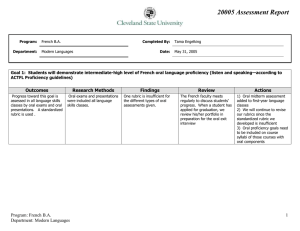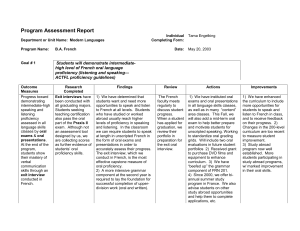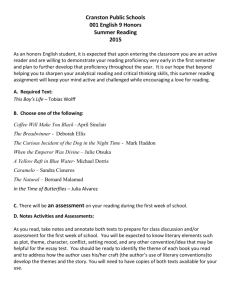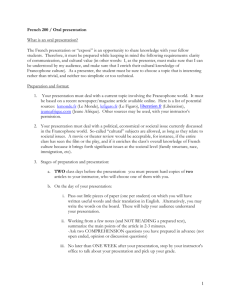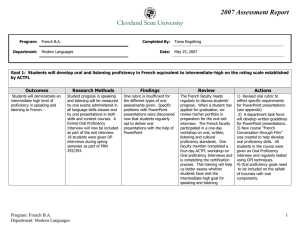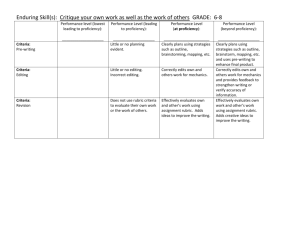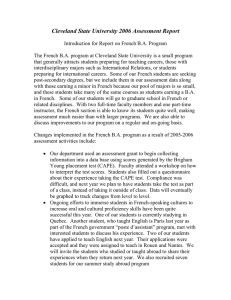2006 Assessment Report
advertisement
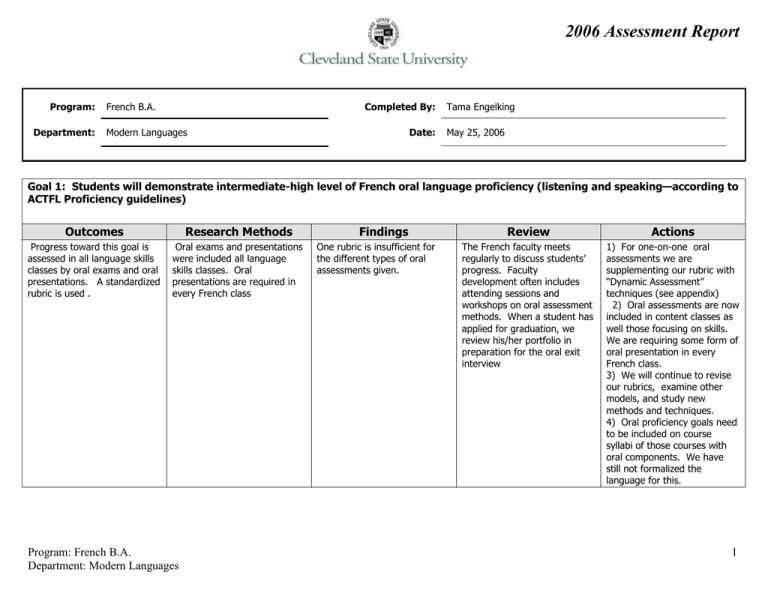
2006 Assessment Report Program: Department: French B.A. Completed By: Modern Languages Date: Tama Engelking May 25, 2006 Goal 1: Students will demonstrate intermediate-high level of French oral language proficiency (listening and speaking—according to ACTFL Proficiency guidelines) Outcomes Research Methods Progress toward this goal is assessed in all language skills classes by oral exams and oral presentations. A standardized rubric is used . Oral exams and presentations were included all language skills classes. Oral presentations are required in every French class Program: French B.A. Department: Modern Languages Findings One rubric is insufficient for the different types of oral assessments given. Review Actions The French faculty meets regularly to discuss students’ progress. Faculty development often includes attending sessions and workshops on oral assessment methods. When a student has applied for graduation, we review his/her portfolio in preparation for the oral exit interview 1) For one-on-one oral assessments we are supplementing our rubric with “Dynamic Assessment” techniques (see appendix) 2) Oral assessments are now included in content classes as well those focusing on skills. We are requiring some form of oral presentation in every French class. 3) We will continue to revise our rubrics, examine other models, and study new methods and techniques. 4) Oral proficiency goals need to be included on course syllabi of those courses with oral components. We have still not formalized the language for this. 1 20006 Assessment Report Graduating seniors demonstrate their oral proficiency during an exit interview conducted in French Exit interviews were conducted with all graduating seniors, who have a major or minor in French Program: French B.A. Department: Modern Languages Two majors and three French minors were interviewed. The two majors demonstrated advanced oral proficiency. Both have been accepted into graduate school. Of the three minors, two demonstrated advanced intermediate level proficiency, while one was only at the intermediate level. Two of these minors, both majoring in International Relations, will work as English assistants in France next year as part of a French government program. We will continue to advise students to apply for this program. The third minor will pursue an MFA in creative writing The French faculty find the exit interview to be the single most useful tool for assessing our program. However, the format is not as conducive to assessing oral proficiency as a formal one on one interview conducted with the single goal of assessing oral skills. While ACTFL has established proficiency guidelines and regularly conducts workshops in this area, the French faculty do not have the specific training to conduct an ACTFL accredited interview. We continue to seek ways to increase the oral proficiency of our students and to provide useful feedback on their skills levels. 1) We have effectively recruited students to work as English assistants in French schools. We invited a student who taught in France last year to speak with interested students. This was a big success and we now have two students who will teach in Rouen and Nantes next year. 2) We recruited seven students for our summer study abroad program. 3) New recruitment strategies include working with the International Business faculty on the language requirement component of the degree. We have proposed that our study abroad program be included as a experiential option, and we are planning information forums for IB students in the Fall.. 4) We will seek funding to participate in an ACTFL proficiency training workshop. 5) One student completed an internship in an international firm that required translation skills. This practicum will be added as an elective 5) Explored models for establishing a language floor in student resident halls. Arabic space approved first. 2 20006 Assessment Report Future teachers have their skills assess by the Praxis II exam Students seeking teaching certification are required to pass the oral part of the Praxis Ii exam. Information as to whether a student has passed the test or not is included on his/her transcript, but we have not yet been able to collect specific test scores Program: French B.A. Department: Modern Languages None of our students took the Praxis exam this year None None 3 20006 Assessment Report Goal 2: Students will demonstrate ability to write accurately in French at an advanced proficiency level on literary or cultural topics, and to use narrative and analytical tools to analyze French literary texts. Outcomes Program: French B.A. Department: Modern Languages Research Methods Findings Review Actions 4 20006 Assessment Report Students are given writing assignments of increasing difficulty, culminating in several long papers in all upper-level culture and literature classes. Selected papers are complied in student portfolios. We examine the writing samples in the student portfolio for all graduating majors to assess the level of the student’s writing skills. Writing is one area discussed during the exit interview. 1) We find the students’ writing improves if given the opportunity to rewrite assignments 2) A solid grammar foundation is the key to writing success. This foundation needs to be established early on, and continually reinforced. The French faculty meets regularly to review the curriculum. We conduct the exit interview and review findings for each graduating senior. Writing samples show that students are meeting the proficiency goals, but feedback on writing continues to be a most valuable learning tool. We find that less prepared students need more opportunities to write. Some students lack the research skills needed to write a research paper. 1) We include grammar components in all skills courses and review as needed in other courses 2) We designed a standardized rubric for writing, but found it to be an inadequate form of feedback. Students now receive detailed written comments on their writing in addition to the rubric to target areas to improve. 3) We revised the writing rubric to better indicate strengths and weaknesses 4) We have designated most of our upper-level courses as writing courses that allow for feedback and rewriting 5) For classes requiring a research paper, library sessions on conducting research have been added. We will work on improving this component. 6) To provide a bridge to upper level writing courses for weaker students, we will offer some of our 200-level content courses at the 300-level and require extensive writing and more reading.. Program: French B.A. Department: Modern Languages 5 20006 Assessment Report Students in all courses at 200level and above will take the Brigham Young placement test each semester Gathering of quantitative data from this test will allow us to chart student progress in language skills over the different levels This test provides an indirect measure of language skills Program: French B.A. Department: Modern Languages Date collection began Spring 2005. An Assessment grant funded a student worker who began compiling statistics into a data base. Students were also asked to answer a brief questionnaire about the experience. It was difficult to convince students to take the exam each semester. Insufficient data to review since few students have taken the exam more than once. We are looking for improvement at each level, so we will continue to gather data. 1) A report on our assessment grant project was given to the Assessment council. 2) To assure that students take the exam each semester, we will have them take the placement exam as part of class (instead of on a volunteer basis) 2) A second assessment grant will pay for a student worker to continue working on the data base with the goal of eventually graphing the data into a useful tool to visually track progress from level to level. 3) Faculty attended a training session where we learned to “read” the results of the placement test. This will help us to better advise our students, and to track their improvements. 6 20006 Assessment Report Goal 3: Students will demonstrate knowledge of French cultural and literary heritage and identity as evidenced by understanding major French literary movements and historical events from the middle Ages to the 18th century and/or the 19th century to the present; they will also demonstrate familiarity with the historical connections between France and the French diaspora, and be able to identify important postcolonial issues, major Francophone writers and/or film makers. Outcomes Research Methods Findings Review Actions Through a sequence of culture and literature courses, students learn major events, people and movements that shaped today’s France, and distinguish major literary movements by identifying characteristics of various genres by period. Content-based exams from a 300-level culture class and an upper-level literature class included in the student portfolio. These provide direct evidence of outcomes being met. The French faculty meet regularly to review the curriculum. During the exit interviews we discuss the mix of culture and literature courses taken with students. The department discussed the need to accommodate students interested in applied language by developing a world language major. 1) Departmental committee established tol develop a world languages major for students with a practical interest in mastering and applying language skills, rather than preparing for a teaching career or graduate degree. Knowledge assessed through content-based essay and short answer tests. Praxis Ii exam required for future teachers also assess this knowledge. Gathered data on which students have passed the Praxis II exam. Individual scores are not reported, but we will ask students to include that information during exit interviews. This exam in an indirect measure of cultural and literary knowledge. Students should take contentbased courses that include literature and culture. The French major now requires a survey class in literature as well as one in civilization. (previously offered as an elective only). Students express interest in an applied track in their major that includes courses in translation. The Praxis II exam includes information on French and Francophone culture and literature. Our curriculum should reflect this mix. Students who have this mix do well on the Praxis Ii exam. All of our students who have taken the exam have passed it, although none of our students took it this year Program: French B.A. Department: Modern Languages 2) Implemented change in major requirements to include one literature and one culture survey. This change provides added flexibility for student schedules as well. 3) Faculty continues to develop Francophone curriculum and to incorporate Francophone components into required courses. l. 7 20006 Assessment Report Through Francophone materials incorporated into required courses (literary works, film, political discussions), and through selective courses on Francophone topics, students will learn about the historical connections between France and the French-speaking world, be able to distinguish some of the major Francophone writers and film makers, and to identify some of the important issues in postcolonial studies Content based exams, research papers and oral presentations will be included in special topics courses (may be on Francophone topics). Some of these materials will be included in student portfolio. Program: French B.A. Department: Modern Languages Students are enthusiastic about courses with Francophone content. This was reiterated during exit interviews. Some Francophone content is included in required coursework, but we decided to make this implied goal more explicit to reflect the importance of Francophone studies today, and the impact it has had on traditional French programs. Our program is keeping in step with a national trend. 4) Faculty has established a revolving schedule that will make Francophone topics available as electives on a regular basis. 8
